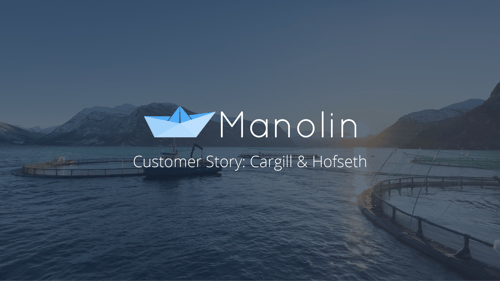From Data to Decisions: Advancing Aquaculture with Digital Twin Technology
 By
Manolin
·
2 minute read
By
Manolin
·
2 minute read
Artificial Intelligence (AI) is reshaping industries globally, and aquaculture is no exception. Here, AI doesn't just automate tasks—it transforms them, providing critical insights from feeding patterns to environmental monitoring that enhance operational efficiency and sustainability.
Despite widespread recognition of AI’s benefits, the broader capabilities of AI-driven technologies like Digital Twins and Data Intelligence remain underutilized in aquaculture. These technologies represent a frontier for predictive analytics and operational optimization that few farms have fully explored.
Understanding and applying technologies like Digital Twins and Data Intelligence can revolutionize the aquaculture sector. For farms, embracing these innovations isn't just beneficial—it's essential for staying relevant in a rapidly evolving industry.
Here’s how these technologies can be applied effectively.
Digital Twins: Mirroring Reality for Better Outcomes
Imagine opening your computer and seeing an exact, living model of your farm on the screen—everything from environmental quality to fish health, updated in real time. Now, think of this model as a clone of your farm, created in the digital world. It's like having a video game version of your farm that you can interact with, test scenarios on, and predict outcomes without any real-world risk. This is your digital twin—a high-tech mirror image of your farm that helps you make better decisions by playing out 'what if' situations virtually.
A Digital Twin is essentially a virtual model of a physical aquaculture system. It replicates metrics such as real-world fish behavior, fish populations, health metrics, and even the minutiae of daily operations. This allows farmers to simulate interventions, foresee potential problems, and gauge the impact of environmental changes without risking actual resources.
Consider the challenge of disease management, a significant concern in fish farming. A digital twin can model disease spread scenarios based on current data, enabling preemptive actions that mitigate or even prevent outbreaks. Such predictive power is invaluable, potentially saving millions in lost yield and treatment costs.
Data Intelligence: Turning Data into Decisions
While Digital Twins provide the scenario modeling, Data Intelligence transforms raw data into actionable insights. It's about understanding the vast amounts of data collected through sensors and monitors to make informed decisions. Data Intelligence can predict feed product effectiveness, optimize farmers sea lice treatment schedules, and even forecast out disease events before they occur on a farm.
Manolin leverages both Digital Twins and Data Intelligence. Our platform analyzes environmental factors, operational behaviors, and biological data to deliver solutions such as:
- Disease Forecasting: Predicting outbreaks before they happen.
- Biomass Estimations: Accurately gauging fish growth to optimize harvest times.
- Anomaly Detection: Identifying unusual patterns that could indicate problems.
- Product Benchmarking: Determining the most effective products for your specific farm locations.
Real-World Application: Manolin, Cargill, & Hofseth's Data-Driven Strategy
Manolin's technology exemplifies the practical application of Digital Twins and Data Intelligence. For instance, our software can detect subtle changes in fish health that may indicate the early stages of disease. By alerting farm managers to these risks, interventions can be timely and targeted, thereby avoiding broader health issues within the stock.
Moreover, Manolin’s analytics can cluster operations based on various factors, allowing for benchmarking against best practices and pinpointing areas for improvement. Such capabilities not only improve individual farm performance but also elevate industry standards.
Our collaborative efforts in implementing a data-driven sea lice strategy, in partnership with Cargill and Hofseth, exemplify the practical application of our cutting-edge technologies in the real world.
Embracing a Data-Driven Future
For aquaculture farms, adopting Digital Twins and Data Intelligence is not just about keeping up with technological trends—it's about leading in a competitive, evolving market. These technologies offer a vision of aquaculture that is sustainable, efficient, and responsive to the challenges of global food production.
In an industry where the stakes are as tangible as the yield from our waters, embracing these advanced AI technologies is a strategic imperative that can define the future leaders of aquaculture.

